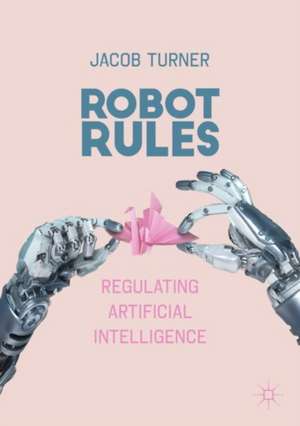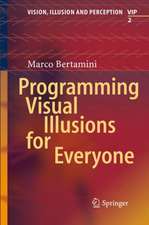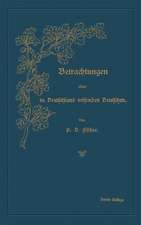Robot Rules: Regulating Artificial Intelligence
Autor Jacob Turneren Limba Engleză Paperback – 7 noi 2018
This book explains why AI is unique, what legal and ethical problems it could cause, and how we can address them. It argues that AI is unlike any other previous technology, owing to its ability to take decisions independently and unpredictably. This gives rise to three issues: responsibility--who is liable if AI causes harm; rights--the disputed moral and pragmatic grounds for granting AI legal personality; and the ethics surrounding the decision-making of AI. The book suggests that in order to address these questions we need to develop new institutions and regulations on a cross-industry and international level. Incorporating clear explanations of complex topics, Robot Rules will appeal to a multi-disciplinary audience, from those with an interest in law, politics and philosophy, to computer programming, engineering and neuroscience.
Preț: 215.30 lei
Nou
Puncte Express: 323
Preț estimativ în valută:
41.21€ • 44.78$ • 34.64£
41.21€ • 44.78$ • 34.64£
Carte disponibilă
Livrare economică 31 martie-14 aprilie
Preluare comenzi: 021 569.72.76
Specificații
ISBN-13: 9783319962344
ISBN-10: 3319962345
Pagini: 349
Ilustrații: XX, 377 p.
Dimensiuni: 148 x 210 x 23 mm
Greutate: 0.48 kg
Ediția:2019
Editura: Springer International Publishing
Colecția Palgrave Macmillan
Locul publicării:Cham, Switzerland
ISBN-10: 3319962345
Pagini: 349
Ilustrații: XX, 377 p.
Dimensiuni: 148 x 210 x 23 mm
Greutate: 0.48 kg
Ediția:2019
Editura: Springer International Publishing
Colecția Palgrave Macmillan
Locul publicării:Cham, Switzerland
Cuprins
1. Introduction.- 2. Unique features of AI.- 3. Responsibility for AI.- 4. Robot Rights.- 5. General Systems for Regulation of AI.- 6. Controlling the Creators: Regulation of Humans.- 7. Controlling the Creations: Regulation of AI itself.
Recenzii
“The book is quite readable … . It discusses the issues in detail and includes loads of references as footnotes, as perhaps one would expect from such a ‘legal’ book. A recommended read for anyone working in advanced AI or robotics.” (M Sasikumar, Computing Reviews, January 8, 2020)
“This is a text that is highly recommended and deserves a place on the bookshelf of every legislator.” (David Harel, Digital Evidence and Electronic Signature Law Review, Vol.16, 2019)
“It’s a well-written book that comes across as highly accessible so that an interested reader from any background could understand the topics and follow his arguments, but there is enough depth in there for a specialist in the subject.” (Tom Dent-Spargo, The Robotics Law Journal, April 1, 2019)
“Jacob Turner argues convincingly that thanks to its ability to make decisions independently and sometimes unpredictably, AI is unique in the sort of practical and ethical problems it can throw up.” (Dominic Lenton, Engineering and Technology Magazine, February 18, 2019)
“Jacob Turner is a persuasive chap. When I opened Robot Rules, I was instinctively hostile to the idea that the fast-developing field of artificial intelligence … . Nearly 400 pages on, my opinions have changed. … the author carefully and authoritatively makes the case that AI presents novel problems for which current legal systems are inadequately equipped.” (Michael Cross, Law Society Gazette, December 7, 2018)
“This is a text that is highly recommended and deserves a place on the bookshelf of every legislator.” (David Harel, Digital Evidence and Electronic Signature Law Review, Vol.16, 2019)
“It’s a well-written book that comes across as highly accessible so that an interested reader from any background could understand the topics and follow his arguments, but there is enough depth in there for a specialist in the subject.” (Tom Dent-Spargo, The Robotics Law Journal, April 1, 2019)
“Jacob Turner argues convincingly that thanks to its ability to make decisions independently and sometimes unpredictably, AI is unique in the sort of practical and ethical problems it can throw up.” (Dominic Lenton, Engineering and Technology Magazine, February 18, 2019)
“Jacob Turner is a persuasive chap. When I opened Robot Rules, I was instinctively hostile to the idea that the fast-developing field of artificial intelligence … . Nearly 400 pages on, my opinions have changed. … the author carefully and authoritatively makes the case that AI presents novel problems for which current legal systems are inadequately equipped.” (Michael Cross, Law Society Gazette, December 7, 2018)
“This book provides a roadmap for a new set of regulations. It asks not just what the rules should be, but who should shape them and how they can be upheld. … Robot Rules provides guidance to lawyers, computer scientists, engineers, ethicists, policy-makers, and all those who want to participate in this task.” (Phys.org, November, 2018)
Notă biografică
Jacob Turner is a lawyer and author based in the UK. He has acted for sovereign states such as Argentina, Greece, Russia and Iraq. Turner holds law degrees from Oxford University, UK, and Harvard University, USA, and has lectured at universities including Oxford, Cambridge, and King's College London. He has previously worked as a speechwriter for a UN Ambassador and as a clerk to a UK Supreme Court Justice.
Textul de pe ultima copertă
This book explains why AI is unique, what legal and ethical problems it could cause, and how we can address them. It argues that AI is unlike any other previous technology, owing to its ability to take decisions independently and unpredictably. This gives rise to three issues: responsibility--who is liable if AI causes harm; rights--the disputed moral and pragmatic grounds for granting AI legal personality; and the ethics surrounding the decision-making of AI. The book suggests that in order to address these questions we need to develop new institutions and regulations on a cross-industry and international level. Incorporating clear explanations of complex topics, Robot Rules will appeal to a multi-disciplinary audience, from those with an interest in law, politics and philosophy, to computer programming, engineering and neuroscience.
Caracteristici
Examines current legal frameworks and regulatory bodies, then offer proposals on how existing laws need to be changed to accommodate AI Deftly analyses the risks and advantages attached to recent technological advancements Contrasts current technologies with older types of technologies









